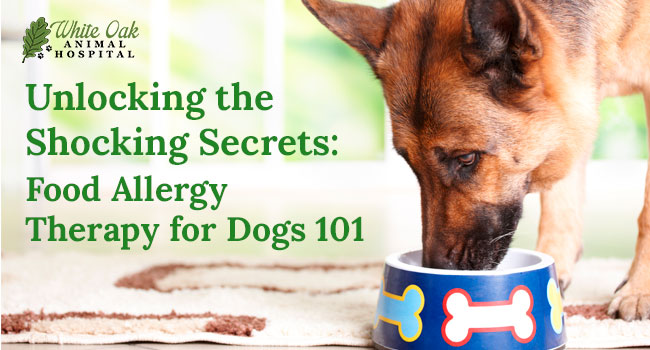
Food allergy therapy for dogs is a commonly-searched subject for dog owners. Growing concerns surround food allergies in dogs, catching the attention of pet caregivers and prompting a closer examination of effective therapy options. Those who own dogs must understand the significance of identifying and managing these allergies for the overall well-being of their canine companions.
Similar to humans, dogs can develop allergies to specific foods, resulting in symptoms such as itching, digestive problems, and more severe reactions. Responsible pet owners must be vigilant in spotting these signs and taking proactive measures to address the underlying issues.
The initial step in ensuring optimal health for our four-legged pals is understanding the root cause of food allergies. This article delves into essential aspects of food allergy therapy for dogs, providing insights into accessible and effective methods. By exploring these details, pet owners can gain the knowledge necessary to administer the best care, ultimately enhancing the quality of life for their furry companions and nurturing a lasting bond between pets and their human caregivers.
Signs and Symptoms of Food Allergies in Dogs
 Recognizing the signs and symptoms of food allergies in dogs is crucial for pet owners devoted to the well-being of their beloved companions. Behavioral cues, like excessive scratching, hint at possible discomfort or irritation. Persistent ear infections may signal an allergic reaction to specific food ingredients, demanding careful observation. Digestive issues, such as ongoing diarrhea or vomiting, may also point to food allergies, requiring vigilant monitoring.
Recognizing the signs and symptoms of food allergies in dogs is crucial for pet owners devoted to the well-being of their beloved companions. Behavioral cues, like excessive scratching, hint at possible discomfort or irritation. Persistent ear infections may signal an allergic reaction to specific food ingredients, demanding careful observation. Digestive issues, such as ongoing diarrhea or vomiting, may also point to food allergies, requiring vigilant monitoring.
On the physical side, vigilant pet owners should be alert to signs like skin redness or swelling, indicating possible allergic reactions. Unexplained hair loss, especially in certain areas, could be a clue to an underlying food allergy. Gastrointestinal discomfort, like bloating or gas, might indicate potential food intolerance.
To distinguish between food allergies and other health concerns, it’s advised to slowly introduce new foods, observing for adverse reactions to identify potential allergens. Seeking guidance from a veterinarian is crucial for precise diagnosis and suitable treatment. Empowered with this understanding, pet owners can proactively take steps, including applying effective food allergy therapy for dogs.
Prevalence Among Different Dog Breeds
Understanding food allergy therapy for dogs is essential for dedicated pet owners striving for optimal care. Exploring factors influencing breed-specific susceptibility and delving into prevalence statistics in selected breeds provides valuable insights for tailored pet care.
 Different breeds exhibit varying tendencies for developing food allergies, with some showing a higher predisposition. This emphasizes the significance of recognizing individual breed characteristics when assessing a dog’s susceptibility to food allergies, requiring vigilant observation and potential preventive measures.
Different breeds exhibit varying tendencies for developing food allergies, with some showing a higher predisposition. This emphasizes the significance of recognizing individual breed characteristics when assessing a dog’s susceptibility to food allergies, requiring vigilant observation and potential preventive measures.
Genetic factors and inherent breed characteristics are pivotal in determining a dog’s likelihood of developing food allergies. Awareness of these factors equips pet owners to anticipate and effectively address potential allergy issues. By understanding their dog’s breed’s unique genetic makeup and characteristics, caregivers can proactively foster a healthier and more comfortable life for their furry companions.
Accurate statistics on food allergy prevalence in specific breeds offer essential insights. Examining prevalence rates allows pet owners to grasp better the likelihood of their dogs developing food allergies. Armed with this knowledge, they can take informed steps toward prevention and management, customizing their approach to the specific needs of their canine companion.
In navigating the complex landscape of food allergy therapy for dogs, acknowledging prevalence among different breeds becomes a cornerstone of informed pet care. This comprehensive understanding empowers pet owners to tailor care strategies, ensuring a healthier and more fulfilling life for their cherished companions based on individual breed characteristics and susceptibilities.
Diagnostic Methods for Identifying Food Allergies
 In the domain of canine well-being, recognizing and addressing food allergies is a crucial concern for responsible pet caregivers. Grasping the available diagnostic tools becomes pivotal in this endeavor. The involvement of professional veterinary consultation becomes integral, contributing expertise for precise diagnosis and customized food allergy therapy for dogs. Real-world case studies furnish practical insights, delineating successful approaches in pinpointing food allergies.
In the domain of canine well-being, recognizing and addressing food allergies is a crucial concern for responsible pet caregivers. Grasping the available diagnostic tools becomes pivotal in this endeavor. The involvement of professional veterinary consultation becomes integral, contributing expertise for precise diagnosis and customized food allergy therapy for dogs. Real-world case studies furnish practical insights, delineating successful approaches in pinpointing food allergies.
Regarding food allergy therapy for dogs, various tests, such as skin tests, blood tests, and elimination diets, are at one’s disposal. Each method has merits and demerits, demanding thoughtful consideration from pet owners. Understanding the strengths and limitations of these testing methods empowers pet owners to make informed decisions regarding the welfare of their dogs. Instances from real-world scenarios underscore situations where food allergy testing resulted in successful diagnoses, showcasing the pragmatic effectiveness of these methods in meeting the distinctive needs of individual dogs.
In pursuing comprehensive care for our four-legged companions, a grasp of diagnostic methods and adept food allergy therapy for dogs becomes imperative. Seeking professional guidance and gaining insights from practical instances ensures that pet owners can deliver optimal care, nurturing the health and joy of their canine companions.
Food Allergy Therapy for Dogs
 Understanding food allergy therapy principles is crucial when dealing with this matter in our cherished canine friends. This process involves carefully identifying and managing food components that trigger adverse reactions. Pet owners can start a journey to enhance their dogs’ well-being and overall health by grasping these principles.
Understanding food allergy therapy principles is crucial when dealing with this matter in our cherished canine friends. This process involves carefully identifying and managing food components that trigger adverse reactions. Pet owners can start a journey to enhance their dogs’ well-being and overall health by grasping these principles.
A common and effective therapeutic approach is adopting special diets. These diets are designed with precision to remove allergens, addressing the core issue of adverse reactions. The focus is on selecting ingredients that avoid known allergens and promote optimal health for dogs. Though appearing straightforward, this approach is the foundation of food allergy therapy for dogs, highlighting the potency of personalized dietary changes.
Supplementing these specialized diets are allergy-friendly treats and supplements. These additions are crucial in taking a comprehensive approach to food allergy therapy for dogs. Beyond regular meals, these treats and supplements contribute to nutritional support, addressing the unique dietary needs of dogs dealing with food allergies. Including these elements enriches the therapeutic strategy, recognizing that a well-rounded approach often produces the best results.
In some instances, medications become part of the therapeutic toolkit. Medications are thoughtfully chosen based on the individual dog’s condition and symptoms. While not the sole focus, pharmaceutical interventions are supportive in relieving immediate discomfort and enhancing the overall effectiveness of food allergy therapy for dogs.
Concluding our discussion on food allergy therapy for dogs, it’s essential to recognize the challenges in adopting and sustaining such routines. Navigating dietary changes, finding suitable products, and maintaining consistent adherence can be hurdles for pet owners. However, the potential benefits to your dog’s health make overcoming these challenges worthwhile.
As responsible pet owners, prioritizing your dog’s health is commendable. Understanding the significance of a well-managed food allergy therapy for dogs can significantly impact your furry companion’s overall well-being. It’s not just about addressing symptoms but fostering a lifestyle that promotes enduring health and happiness.
Given the complexities involved, a crucial step is to seek professional advice. Consulting with veterinary experts ensures the chosen food allergy therapy aligns with your dog’s needs. Dr. Casey Damron at White Oak Animal Hospital is ready to offer compassionate and tailored care for your beloved pets.
We encourage pet owners to benefit from the expertise at White Oak Animal Hospital, where integrative options not found elsewhere are available for your consideration. With over 28 years of experience and having treated over 6,000 pets, Dr. Casey Damron and the committed team at White Oak Animal Hospital bring a wealth of knowledge and dedication to each patient.
 To enhance accessibility, White Oak Animal Hospital provides TCVM Telemedicine consultations, offering a convenient and effective way to remotely address your dog’s health concerns. This innovative approach ensures that expert guidance is accessible, even from the comfort of your home.
To enhance accessibility, White Oak Animal Hospital provides TCVM Telemedicine consultations, offering a convenient and effective way to remotely address your dog’s health concerns. This innovative approach ensures that expert guidance is accessible, even from the comfort of your home.
Essentially, implementing food allergy therapy for dogs is a joint commitment between pet owners and healthcare professionals. Taking proactive steps, seeking expert advice, and utilizing the comprehensive care at White Oak Animal Hospital pave the way for your cherished canine companion’s healthier and happier life. Your dog’s well-being is our priority, and together, we can unlock the secrets to effective food allergy therapy for dogs.
Related Posts
-
Why Try Food Therapy For Dogs?
Have you heard of food therapy for dogs? PET | TAO, a premium holistic pet…
-
Food Therapy for Cats
Could your feline benefit from food therapy for cats? Yes! In fact, you can help…
-
Canine Wellness: Exploring Eastern Food Therapy for Dogs and 3 Alluring Reasons to Embrace It
Eastern food therapy for dogs is a hopeful option to ensure the well-being of our…
-
Discover Health Solutions For Your Pet with a Food Therapy Consultation
A food therapy consultation for your pet may be the key to uncovering their optimal…









